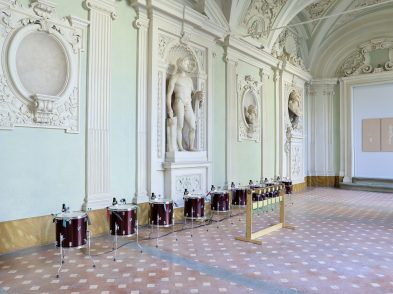As we hail in the spring, Florence hails in the next crop of students arriving for a semester abroad, while the previous cohort waves an undoubtedly teary goodbye. With the student population renewed, questions are asked about how Florence can accommodate the vast number of international students that it hosts for semesters, years and degrees at a time.
These days, it seems as if finding student housing anywhere is a struggle. Prices rocket, options narrow and blood pressure rises even just thinking about it. It is no secret that the viable living options in the centre of Florence are slim to none, and students are only one group among the many struggling to find a spot. The University of Florence alone welcomes 54,000 students, combining Italian and international students, who benefit from its 500 international mobility partnerships and 900 Erasmus agreements. This, alongside 45+ American universities, the European University Institute (EUI) and numerous creative higher education institutes, contributes to Florence’s total of 36,000 international students.

Given these figures, the difficulties seem inevitable. Part of the problem is the density of short-stay rentals through websites such as Airbnb, which has recently faced limitation by a prohibitive bylaw from the city council. Combine the accommodation-finding ordeal with some homesickness, cultural unfamiliarity and potentially a language barrier, and it’s not difficult to sympathize.
Like many cities across Europe, the concept of a “luxury student hotel” has become a new phenomenon in Florence in recent years. Ask anyone for memories of their student days and the words “luxury” and “hotel” aren’t likely to come up very frequently. Often outside the city centre and at higher price points, these accommodation services are seeing increased demand as one of the few options that students can turn to when conveniently located and sensibly priced apartments are few and far between. They combine newly built or renovated buildings, an abundance of included services, squeaky clean interiors with modern design, but are only financially viable for a select group of students.
Speaking with one “resident”, their experience limited them from having an authentic experience, reporting that the accommodation brought them further out of the city centre than any of their friends and was mostly occupied by temporary residents that leave after a few months maximum. The common rooms, on-site gym and coworking space made for a convenient stay, but the payback of the experience was that it’s “exactly like living in a hotel”. And that’s for the lucky ones that succeed in finding a room there. Some were told two months prior to their arrival that no accommodation was available, forcing them into a panicked search for lodgings, with little option to stick to their budget or choose a preferred location.
For others, accommodation is organized by the host universities and provides students with a place in institutionally owned apartments or an affiliated housing agency. Here they might end up sharing a bedroom with one or more other people, all of whom are attending the same university, and cultural exchange is not included in the package deal. Students in this situation reported that they couldn’t practise any of the Italian they learnt in lessons as they did not speak to many, if any, Italian people and socialized almost exclusively with fellow students from their home country. When choosing their accommodation, they could even request to live with people they already knew from their colleges, yet they prioritized a central location and the convenience of the organization being done for them above finding lodgings with locals.
Very few students opt out of the systems run by their institutions since they are aware of how difficult it can be. Those who do organize their own accommodation often turn to Airbnb as their first port of call and find a host that accepts longer-term rentals. The irony in this is clear: tourist-oriented sites, including Airbnb, are largely to blame for the scarcity of city centre apartments. However, the alternative is to use an online housing service or social media group where you won’t able to visit the apartment or meet your landlord, hence running the risk of being scammed. For those without the help of a college administrator, this is a gamble they have to take, especially if a visa application requires proof of accommodation on arrival.
The problems culminate in a general feeling that students are kept on the peripheries, somewhat excluded from cultural immersion and at an arm’s length from an authentic Florentine experience. Contradictory as it might sound, most of what you learn through a study-abroad experience is outside of the academic setting, but how can students find it in one such “luxury student hotel” or all-inclusive apartment contract?
The discourse here unjustly implies that Florence is becoming a long-term holiday destination, even for those studying here for a number of months or a year. A semesterly influx of new international students constantly refreshes the city with youth and diversity, but the level of integration is limited by the structures they depend on while living here. It is surely up to the individual to make Florence a home and themselves a thread in its rich fabric, but that is far from easy when they are pushed to the sidelines by necessity and are too easily contained by the less-than-Florentine Florence.
More city living options and culturally immersive experiences open to students, however temporary their residence, would benefit both them and the city. Students would profit from the authenticity of their time here and Florence would gain from their enthusiastic and generous presence, not in the exclusive apartment blocks or specifically marketed hotspots, but in the Florence that needs the longer-term investment so as not to be compromised to the tides of over-tourism.








